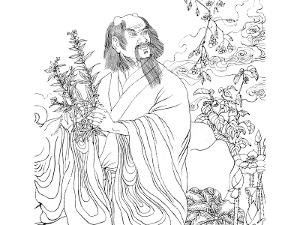(单词翻译:单击)
Shen Nong, sometimes known as the Yan Emperor or the Emperor of the five grains, is a legendary Emperor of China and culture hero of Chinese mythology who is believed to have lived some 5 000 years ago and who taught ancient Chinese the practices of agriculture.
神农,有时也叫炎帝或五谷先帝。中国传说中的君主和神话里的耕种英雄。人们认为神农生活在大概5000年前,教会了中国古代人民如何耕作。
Appropriately, his name means "the Divine Farmer". Considered to be the father of Chinese agriculture, this legendary emperor taught his people how to cultivate grains as food, so as to avoid killing animals.
神农的名字和他的身份很相配,这位被人们尊为中国“农业之父”的传说中的君主教会他的臣民如何种植谷类以获取粮食从而不再猎杀动物。

He is said to have tasted hundreds of herbs to test their medicinal value, and is assumed to be the author of Shen-nung pen ts'ao ching (Divine Husbandman's Materia Medica), the earliest extant Chinese pharmacopoeia.
据说神农尝遍百草以试验它们的疗效,并且写了《神农本草经》。《神农本草经》是中国现存最早的药典。
This text includes 365 medicines derived from minerals, plants, and animals.
这本书里涵盖了矿物、植物、动物共365种药材。
The true authorship of this work is also unknown.
这本书真正的作者是谁无从得知。
He is credited with identifying hundreds of medicinal (and poisonous) herbs by personally testing their properties, which was crucial towards the development of Traditional Chinese medicine.
据说神农通过亲自试验草药的性质确定了数百种(有毒的)草药。这对中国传统医药的发展是非常重要的。
Tea, which acts as an antidote after being poisoned by some seventy herbs, is also said to be his discovery.
据说,神农还发现中了70余种草药的毒之后可以通过喝茶来解毒。
Chinese legend places this occurrence in 2737 B. C., and states that the leaves from burning tea twigs blew upwards from the fire and landed in his cauldron of boiling water.
传说认为这件事发生在公元前2737年,还说正在燃烧的茶树枝上的叶子飞了起来落到了神农的开水锅里。
Shen Nong is venerated as the Father of Chinese medicine.
神农被尊为中国的“医药之父”。
He is believed to have introduced the technique of acupuncture.
人们认为针灸疗法也是他提出的。


